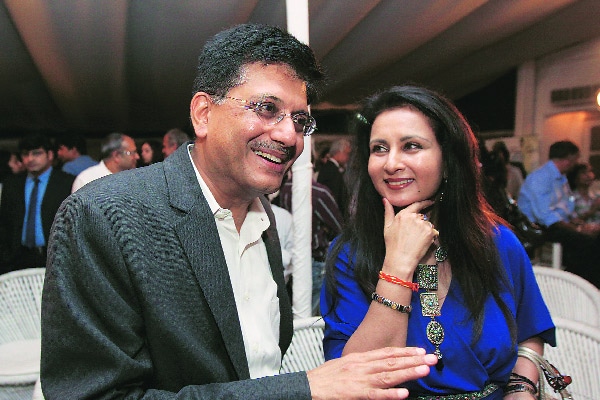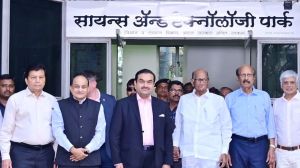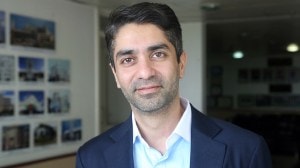Reflections from Ground Euro
Ambassadors of Spain,Greece and Portugal presented a united face on the survival of the euro at the Express Adda.
As the world struggles to come out of the European debt crisis,Ambassadors of Spain,Gustavo Manuel de Aristegui; Greece,Ioannis Raptakis; and Portugal,Jorge Roza de Oliveira,visited Mumbai last week and presented a united face on the survival of the euro at the Express Adda,taking a strong stance against the actions of rating agencies.

In a candid and informal discussion with bankers,industrialists and bureaucrats,they discussed a plethora of issues surrounding the euro,the austerity measures they were adopting,the economic growth in their countries and the way forward for the European Union. KV Kamath,non-executive chairman of Infosys and ICICI Bank,co-hosted the session along with Shekhar Gupta,Editor-in-Chief,The Express Group.
The Ambassadors later responded to questions from the audience,which included KC Chakrabarty,Deputy Governor of Reserve Bank of India; Nikhil Meswani of Reliance Industries; Hemendra Kothari of DSP BlackRock Limited; Jishnu Sen of Grey Group India and Nilesh Shah of Axis Bank

On credit rating agencies
Aristegui: Credit rating of some of our nations is simply not fair and unreal. Nobody can say that we are about to be downgraded to junk bond because its simply not true. Spain can pay its obligation,and the spread the difference that Spain has to pay for financing in comparison to German bonds does not reflect the reality of the German and Spanish economies. Spain has a smaller public debt as compared to Germany,much lower than England and one of the lowest in Europe. I dont think that the ratings can be accurate,as when Lehman Brothers was just downgraded from AAA to AAA,they defaulted.
Raptakis: Something we have to blame Europe for is that we have not established a rating company of our own and rely on three US-based rating companies.
KV Kamath: There is a same sort of cacophony that India is going to be downgraded; we need a response to this in a united way because that is stretching imaginations too far.
On the way the rating agencies operate
Aristegui: I can tell you as a diplomat and later as a politician that I saw some very prestigious institutions that produce intelligent reports. They would send a youngster to visit a country,stay there for a week,speak to some five people and then come out with a 60-70 page report,which is sold for hundreds of euros or dollars. I know how that report was made and I know what that guy knew about that country literally nothing. I have to think that it is pretty much the case of rating agencies that are dominating the world right now.
On survival of the euro
Aristegua: I think the euro is going to survive and it needs to survive. Euro is still the worlds greatest economic and financial power. I think this problem is not going to be solved by dismantling the euro,but by strengthening it.
We did two things to be able to act coordinatedly fiscal union and the banking union,and I would like to add a third thing a coordinated budget and a more coordinated economic policy.
Oliveira: Everyone in Europe is of the opinion that the euro is an achievement that is irreversible; once you are there,you are there to stay. You are there,you suffer,you prosper but you stay for the better.
Raptakis: There is no doubt in my mind that the euro will survive. There is a cacophony people are talking of the exit of Greece from the euro. No,there is not going to be any exit of any country from the euro,because the idea is an achievement that we cannot afford to lose.
On the likely impact of eurozone breaking up
Oliveira: A break-up of the eurozone would be devastating not only for the eurozone,but also for the rest of the world and its something that no one wants. India wont be a better place if the euro breaks up,and there is a huge tragedy in Europe.
Aristegui: Europe is extremely interdependent,whatever happens to the southern countries is bound to affect everyone. If we have an economic crisis,who is going to buy the goods that are produced elsewhere?
On why the crisis was an eye-opener
Raptakis: We are thankful to the crisis that we could see the problem and deal with it. A lot of reforms that we started,for instance,the pension and health-care systems,we were suffering because they were large and could not survive the way they were. However,because of the crisis,we managed to make them smaller and more efficient.
Oliveira: Portugal has a programme that it has to follow. Things are clear on what we have to do and there are results of what is being done.
On the biggest problem their country faces
Aristegui: Unemployment is officially at 22.5 per cent but the biggest problem we face now is youth unemployment,which peaks at 25 per cent. Just imagine that we are not talking about a lost decade in politics,we are talking about a lost generation,and this did not happen overnight. And this is not because of the crisis but the crisis made things worse.
On reviving business and exports without the instrument of devaluation
Raptakis: Everyone has to suffer in order to have a better future,but how can we do it without the instrument that we had before joining the euro devaluation. I know that there is only one way in the European Union to do it,and that is by improving our competitiveness. Once the cost of work in Greece goes down,our products will be more competitive than German products. Of course,we will not start producing BMWs but if we produce stuff that is of competitive price,we are going to penetrate the German economy. Our products became more competitive and our exports have increased by 25 per cent. So we have some benefits out of this crisis; I would say that it is because of the crisis.
Aristegui: Of course,that is one of the classic systems that in an economic crisis,you devaluate. What you are searching with devaluation is to increase exports and if you can do that without devaluation,then why devaluate? The value of euro has also gone down from 1.4 to a dollar to 1.2 and 1.19,which of course,is helping our exports enormously.
On what needs to be done within the European Union
Raptakis: We are going to make this monetary union work,the political union work; we have to get closer on issues such as a defence union,which will have to become a reality. Today,we are short of enhanced cooperation. We have to get the political union in order to get the United States of Europe I dont know when.
Aristegui: I believe more in budgetary coordination.
On going the Japan way or the India way for growth
Aristegui: Japan is still Japan; they had a stagflation but it is a very solid economy and country. I think the best formula is somewhere in the middle. You do have to practise austerity,you cant spend the money that you dont have,but it is a demand crisis and you have to act have austerity measures on one hand and stimulus plans on the other.
- 01
- 02
- 03
- 04
- 05































